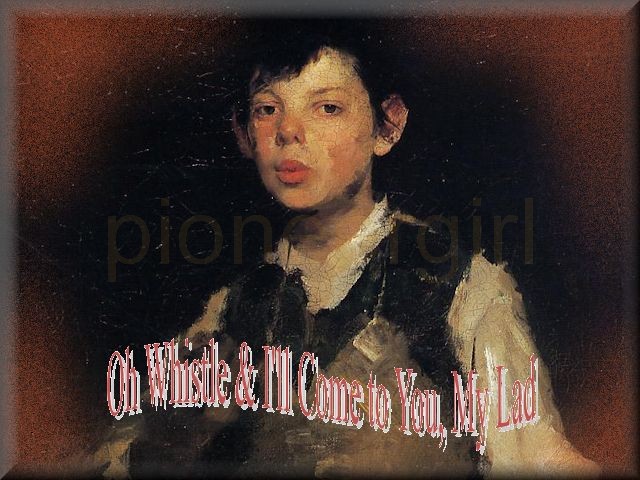Oh Whistle and I’ll Come to You, My Lad

 ‘Would you?’ Almanzo asked. – ‘Of course not!’ Laura answered. ‘That’s only a song.’ – ‘Better whistle for Nellie; she’d come,’ teased Ida. — These Happy Golden Years, Chapter 20, “Nellie Oleson”
‘Would you?’ Almanzo asked. – ‘Of course not!’ Laura answered. ‘That’s only a song.’ – ‘Better whistle for Nellie; she’d come,’ teased Ida. — These Happy Golden Years, Chapter 20, “Nellie Oleson”
OO Whistle and I’ll Come to You was written by Robert Burns in 1793 and appeared in James Johnston’s Scot’s Musical Museum II, published in 1798. The tune is “The Irish Lover’s Morning Walk,” which appeared on a single sheet with music in 1780.
Robert Burns (1759-1796) was born near Ayr, Scotland, the son of a poor farmer. As a teenager, “Rabbie” began writing verses in Scots dialect and received recognition for his writing. He unsuccessfully labored as a farmer until circumstances (he fathered at least nine children by five different women) made him decide to move to Jamaica. In order to secure money for the trip, he published a book of his verses at Kilmarnock in 1786. It was so highly regarded that he was asked to come to Edinburgh and publish another edition of the work.
This was the turning point in Burns’s life. In Edinburgh, he was among society, riches, and learning, and both his poetry and conversational skills were much in demand. Hard work and hard drink led to health problems, however, and he died at age 37. Today, Burns is the Official Bard (poet) of Scotland, and on his January 25th birthday each year, Scots around the world celebrate with a Burns Night Supper.
Mary Ingalls was such a fan of Robert Burns that at her graduation from the Iowa College for the Blind, she recited an essay on Burns, “Bide a Wee and Dinna Weary.”
O WHISTLE AND I’LL COME TO YOU
(by Robert Burns)
[chorus] O whistle, and I’ll come to ye, my lad,
O whistle, and I’ll come to ye, my lad,
Tho’ father an’ mother an’ a’ should gae mad,
O whistle, and I’ll come to ye, my lad,
1. But warily tent when ye come to court me,
And come nae unless the back-yett be a-jee;
Syne up the back-stile, and let naebody see,
And come as ye were na comin’ to me,
And come as ye were na comin’ to me.
2. At kirk, or at market, whene’er ye meet me,
Gang by me as tho’ that ye car’d na a flie;
But steal me a blink o’ your bonie black e’e,
Yet look as ye were na lookin’ to me,
Yet look as ye were na lookin’ to me.
3. Aye bow and protest that ye care na for me,
And whiles ye may lightly my beauty a-wee;
But court na anither, tho’ jokin’ ye be,
For fear that she wile your fancy frae me,
For fear that she wile your fancy frae me.
For reference — ‘a: all; gae: go; tent: heed or observe; nae: not; back-yett: back gate; syne: since; kirk: church; gang: go on; bonie: beautiful; lightly: scorn.
OH WHISTLE AND I’LL COME TO YOU, MY LAD
(from These Happy Golden Years)
Oh whistle and I’ll come to you, my lad,
Oh whistle and I’ll come to you, my lad,
Though Father and mither and a’should gae mad,
Oh whistle and I’ll come to you, my lad.
CLICK HERE to listen.
Click on the above images to view a copy of undated sheet music of “O Whistle and I’ll Come to You, My Lad,” published by Oliver Ditson in Boston.
This music is archived in the Lester S. Levy Collection of Sheet Music, part of Special Collections at the Milton S. Eisenhower Library of The Johns Hopkins University. The collection contains over 29,000 pieces of music and focuses on popular American music from 1780-1960.

“Oh Whistle and I’ll Come to You, My Lad” (THGY 20)
“Oh whistle and I’ll come to you, my lad”





